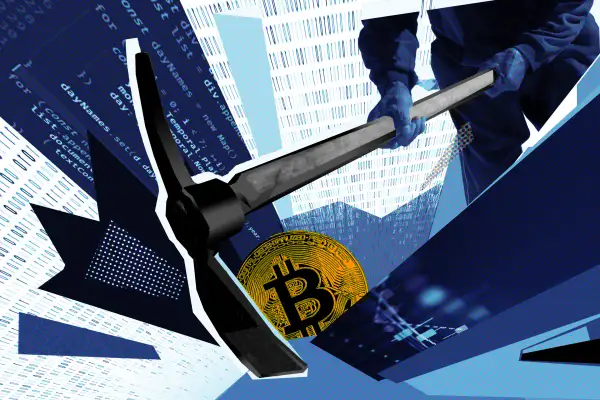Is Bitcoin Mining Profitable?
Money is not a client of any investment adviser featured on this page. The information provided on this page is for educational purposes only and is not intended as investment advice. Money does not offer advisory services.

Interested in mining bitcoin, but not sure if it’s worth the investment? You’re not the only one. With energy prices on the rise, many people are wondering if bitcoin mining is still profitable.
Here’s the short answer: Bitcoin mining can be profitable if you invest in the right tools and join a bitcoin mining pool. That said, there are a lot of variables, and a high profit isn’t guaranteed. Mining isn’t for everyone. This article will walk you through the details of bitcoin mining, including the risks, profitability and steps to get started so you can decide if it’s right for you.
Table of contents
- What is bitcoin mining?
- How does bitcoin mining work?
- How much can you make mining bitcoin?
- Pros and cons of mining bitcoin
- How to start bitcoin mining
- Bitcoin mining FAQ
What is bitcoin mining?
Let’s start with the basics. What is bitcoin mining, and how does it work?
Bitcoin mining is a completely digital process that requires highly technical equipment. Put simply, “mining” refers to the process of validating transactions and adding them to a public ledger called the blockchain. Each time a miner adds a new block of transactions to the blockchain, they earn 6.25 BTC. The dollar value of that amount fluctuates with the value of bitcoin.
What is a bitcoin?
Bitcoin is a type of cryptocurrency, which is digital currency that allows peer-to-peer transactions without having to go through a bank and without oversight by any government. In other words, it's decentralized. There are many kinds of cryptocurrencies, like ethereum and dogecoin, but bitcoin was the first and is the largest by market capitalization.
Bitcoin's price per coin has varied wildly thanks to the crypto market's volatility but as April of 2023, the price of bitcoin is around $30,000 per coin.
How does bitcoin mining work?
Bitcoin mining might sound complicated, but it’s pretty straightforward once you understand the cryptocurrency mining process. Miners are essentially competing to guess a complex 64-digit number known as a hash. That’s why it’s sometimes referred to as “hash mining” and the amount of computing power being put into mining is called the "hash rate."
To guess the hash, miners use powerful computers to generate guesses as quickly as possible. Think of it this way: each digit in the hash has 16 possibilities (the digits 1 through 10 plus letters A through F). So, to generate a guess, you could roll a 16-sided die 64 times. That would give you one guess — the problem is, there are trillions of possible answers.
That’s where a bitcoin mining computer comes in. Using tons of processing power and a whole lot of energy, miners’ computers basically roll that die at super speeds. The miner who arrives at the correct hash first and adds a bitcoin block to the blockchain receives the reward.
A lot of bitcoin miners choose to join mining pools: groups that share their computing power and split the reward. Joining a pool improves your chances of adding a block without having to invest in another bitcoin mining machine, but it also lowers the payout you receive.
Is bitcoin mining legal?
Bitcoin mining is legal in the U.S. Some countries, such as Egypt, China and Qatar, have outlawed blockchain mining because it threatens national currencies.
While you can legally mine crypto in every U.S. state, some regions have zoning restrictions and environmental regulations that make it tricky to establish a bitcoin mining farm. Unless you’re planning on mining on a large scale, those restrictions probably won’t affect you. Just check out the laws in your area before you get started.
How much can you make mining bitcoin?
Block rewards are cut in half every 210,000 blocks (about every four years). That means the current reward of 6.25 BTC will be reduced to 3.125 BTC in 2024.
The dollar value of that bitcoin reward can vary dramatically. Bitcoin, like any cryptocurrency, is volatile. Its value spikes and decreases within short time periods. That unpredictability is why a lot of investors wonder: Is bitcoin safe?
Even so, 6.25 BTC is still a lot of cash. In April of 2023, the value of one bitcoin was around $30,000, making the block reward worth $187,500. And that’s relatively low — some investors think bitcoin is in for another rapid spike in the near future, though it’s hardly a given considering current crypto trends.
So is crypto mining profitable? The bottom line is that there is no set amount bitcoin miners earn. Mining requires significant investment, and the results are unpredictable. It’s up to you to decide if it’s worth the investment to have more BTC in your crypto wallet.
Pros and cons of mining bitcoin
Bitcoin mining isn’t something you should jump into casually. It takes time, energy and expensive equipment, but the payout might be worth it. To help you decide if bitcoin mining is right for you, here are a few pros and cons to consider.
Pros of mining bitcoin
Bitcoin mining is popular for a reason. It’s an exciting way to earn money outside of a nine-to-five job, without investing in the stock market.
It’s also important within the industry — miners contribute to the bitcoin ecosystem by validating bitcoin transactions and putting new coins into circulation. If there were no miners, there would be no new bitcoin.
The potential earnings
Your potential earnings from bitcoin mining aren’t guaranteed, but they are worth considering. The profitability of bitcoin is measured in dollars per terahash, or TH, per second. That means the amount of money generated by a mining computer that produces a trillion hashes per second. You can check the current bitcoin mining profitability online with a bitcoin mining calculator.
At its highest peak in 2017, bitcoin mining generated $3.39/TH per second. By the end of autumn in 2022, it was closer to $0.104/TH per second.
That’s a complicated way of saying bitcoin miners today don’t make as much as they used to. However, a lot of miners think the profitability will swing back around. Getting started today might mean higher potential earnings in the future.
Plus, mining bitcoin isn’t like swinging a pickaxe all day to mine for gold. Once your bitcoin mining hardware is up and running, there isn’t much active work involved. Successful miners earn passive income as long as their hardware is running.
The mining rewards
It’s important to remember that mining rewards are paid in bitcoin, not dollars. So even when bitcoin is at its lowest USD value, the reward in BTC is still the same.
There’s no telling when the value of bitcoin will climb again. Mining allows you to collect bitcoin in your crypto wallet without actually buying it. Holding onto those rewards could lead to a massive payout in the future.
Cons of mining bitcoin
It’s no secret that bitcoin mining isn’t for everyone. The equipment is expensive, the profits aren’t guaranteed and the environmental impact is substantial. Even if you’re excited about the benefits, it’s important to consider the downsides.
The upfront mining equipment and electricity costs
The biggest drawback of bitcoin mining is the cost. There’s no way around it — setting up a mining operation is expensive.
In the early days of bitcoin, miners could use standard computers, but as more people joined the bitcoin network, mining difficulty increased. Today, you need a specialized computer (known as a mining rig) if you want a shot at earning the block reward. Even people who are part of a mining pool need the right mining hardware.
On top of the hardware investment, there’s also the cost of electricity to consider. Mining rigs use a ton of energy and require fans to keep them from overheating. You should be prepared for a hefty monthly power bill if you want to start mining.
Bitcoin energy consumption and greenhouse gas emissions
Another important factor to consider is bitcoin’s heavy use of energy and its negative environmental impact. Although it greatly fluctuates in a given year, the bitcoin network’s estimated annual energy consumption is 145.51 TWh, as of April 2023, according to data from the University of Cambridge. This is a greater energy consumption than some countries, including the Philippines and Norway. Meanwhile, bitcoin’s estimated yearly greenhouse gas emissions are comparable to a country like Kenya.
Whether these operations can transition into using renewable energy sources is a point of contention between proponents and opponents of crypto. However, the current ecological impact is undeniable.
It's risky
Bitcoin, like any other digital currency, is risky. There’s no telling when the market will crash. It's possible for the value of bitcoin to tank so low that mining profits become almost nonexistent.
Of course, that volatility goes both ways. As possible as it is for bitcoin to crash, it’s also possible for it to spike and boost the value of mining in an instant.
How to start bitcoin mining
If you’re sold on the pros and want to start mining, read on for a basic overview of how to start bitcoin mining.
Set up a digital wallet that accepts bitcoin
First, you’ll need to set up your crypto wallet. Payment comes in the form of BTC and needs to be stored. If you invest in crypto, you might have a wallet already.
There are a few types of digital wallets, including hardware, desktop and mobile wallets. These are all secure options, but you’ll get the most security out of a hardware wallet — it’s sort of like a wall safe for your bitcoin.
Do some research and install the best digital wallet for your needs before you start mining.
Make the necessary investments
Unfortunately, you can’t start mining bitcoin from your smartphone or a standard laptop. You need to invest in specialized equipment.
Bitcoin mining software
Cloud-based software allows you to connect to the bitcoin network and start mining. These programs are generally free and use the power of your mining rig to generate trillions of hashes per second.
You can start browsing for the best bitcoin mining software at any time, but mining experts recommend investing in your hardware before you download any mining applications. That way, you’ll know your mining capacity and can pick the best program for your rig.
Bitcoin mining rig
Now for the tough part. Bitcoin mining hardware is the most significant investment you’ll have to make before you start mining.
Bitcoin mining rigs — the term often used for these mining setups — can vary significantly, including in price and size.
One way to set up a mining rig is with an ASIC, or application-specific integrated circuit. ASIC mining is a popular option for bitcoin miners. Modern bitcoin mining sites store hundreds of ASICs in temperature-controlled rooms, but it is possible to buy and run a single machine from your home.
The price of a modern ASIC fluctuates with the popularity of bitcoin mining. Some ASIC miners pay as much as $10,000 for their hardware. You can also find these computers second-hand online or even rent them from a mining facility.
Solve complex algorithm puzzles
Once your hardware is set up and you have the right software installed, you can start mining.
While you’ll often hear bitcoin mining described as “solving complex math problems,” it’s not like you’re sitting there with a calculator or taking an algebra test. Your software is running 24/7, coming up with trillions of potential hashes per second.
At this stage, there is minimal maintenance involved. You’ll have to make sure your hardware is running efficiently and not overheating. Other than that, it’s basically a matter of patience.
Bonus step: join a mining pool
With your equipment up and running, you might want to consider joining a mining pool.
The more people that join the bitcoin mining network, the harder it is to add a block and receive the block reward. That’s why a lot of miners choose to join pools and work together. Linking up with other miners is the only way to keep up with large-scale companies and mining farms, which generate the majority of bitcoin mined today.
Is it worth it to join a mining pool? That depends on what you’re willing to gamble. When you join a pool, your odds of adding a block to the blockchain go up, but your payment is split between other miners in the pool.
On the other hand, if you’re working on your own with only one mining rig, there’s a chance you’ll never earn enough bitcoin to make up for what you invested in the hardware. It’s up to you to weigh those transaction fees and decide if joining a mining pool is right for you.
The pickaxe strategy
If you want to get involved in bitcoin mining without actually becoming a miner, consider the “pickaxe strategy.”
This method comes from a metaphor about mining for gold: The smartest investor in a gold rush is the person who sells pickaxes to the miners. In bitcoin mining, that means investing in companies that produce mining hardware. These companies are on the rise as miners search for better, more efficient technology.
There are definitely risks to investing in mining hardware companies, but it can be a good way to get involved in the world of mining without buying any hardware yourself.
Is bitcoin mining right for you?
Bitcoin mining is risky, consumes a lot of energy and requires powerful, specialized equipment. Despite all that, plenty of people are still drawn to the appeal of mining as an investment opportunity.
It’s completely possible to make a profit from bitcoin mining. Whether or not it will be profitable for you depends on what you’re willing to invest — plus a little bit of luck. Miners will continue to build the blockchain for years to come. So, if you think bitcoin mining is right for you, now may be the time to dive in.
Bitcoin mining FAQ
How long does it take to mine one bitcoin?
What does mining bitcoin mean?
How much does it cost to mine bitcoin?
How much electricity does bitcoin mining use?
What is a bitcoin mining rig?
Summary: Is bitcoin mining profitable?
- Bitcoin mining can be profitable if you invest in the right tools and join a bitcoin mining pool, but there are a lot of variables and a high profit isn’t at all guaranteed.
- The pros of bitcoin mining are the potential earnings.
- The cons of bitcoin mining are that it's expensive, takes up a lot of energy and can be risky.
- There is no set amount bitcoin miners earn, and taking part requires significant investment since you'll need specialized equipment, so make sure to do your research before you decide to mine bitcoin.
More from Money:
8 Best Crypto Wallets of April 2023
6 Best Crypto Exchanges of April 2023
Coinbase for Beginners: A Complete Guide to Buying and Selling Cryptocurrency on a Popular Exchange

